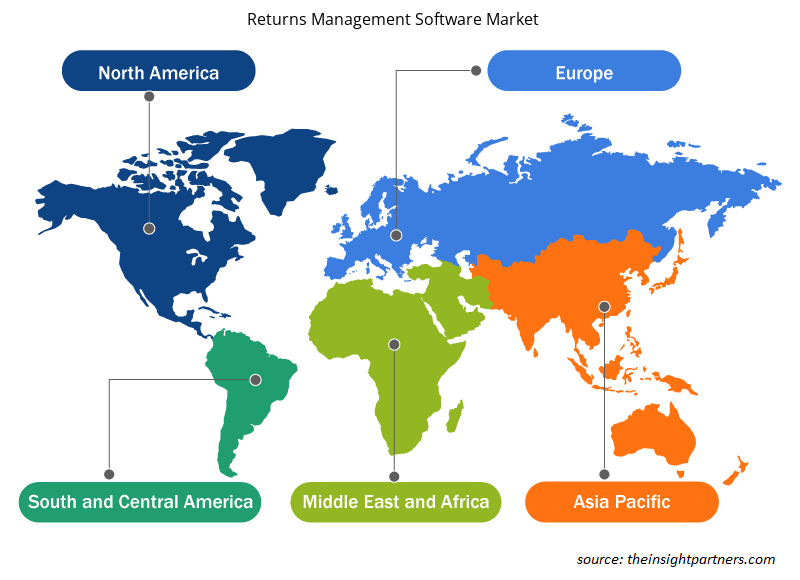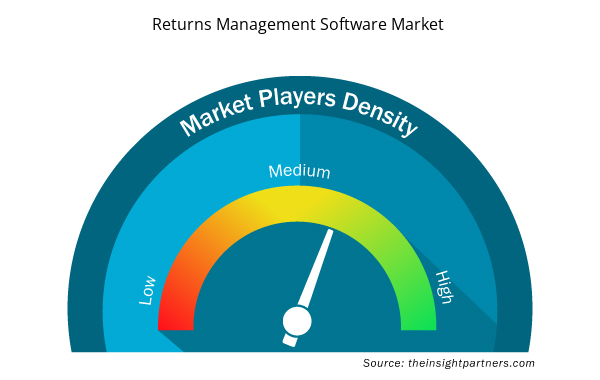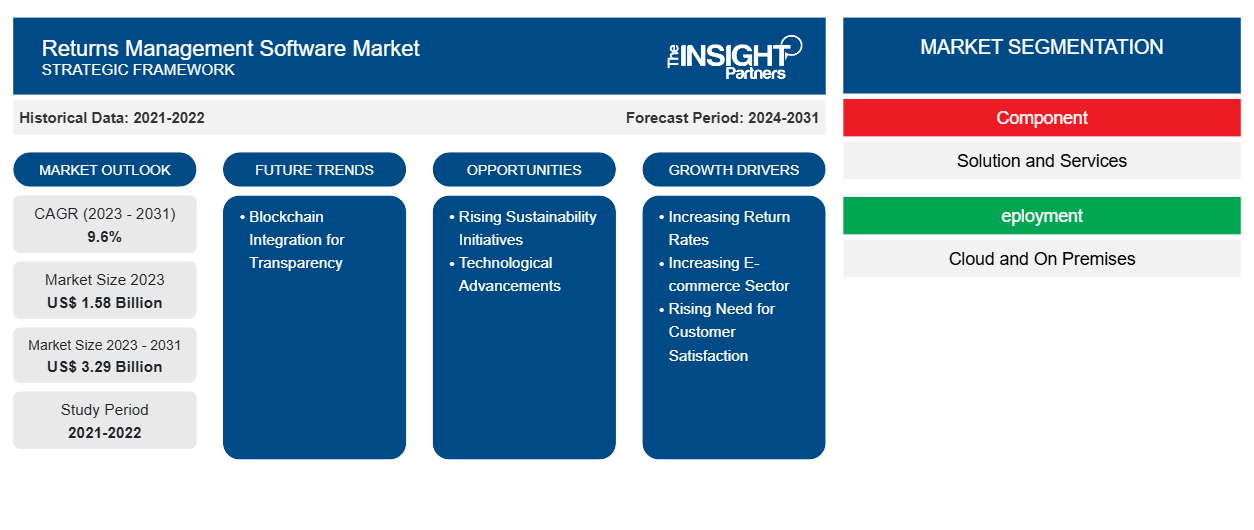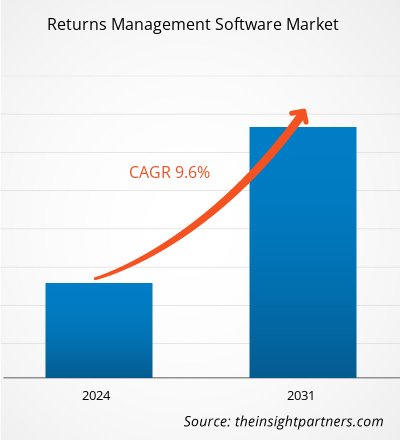返品管理ソフトウェア市場は、2023年に15億8,000万米ドルの価値があり、2031年までに32億9,000万米ドルに達すると予想されています。また、2023年から2031年にかけて9.6%のCAGRを記録すると予測されています。レポートには、現在の返品管理ソフトウェア市場の動向と市場の成長に影響を与える推進要因を考慮した成長見通しが含まれています。
返品管理ソフトウェア市場分析
今日の競争の激しい市場では、顧客はシームレスで手間のかからない返品体験を期待しています。返品管理ソフトウェアは、効率的で透明性の高い返品プロセスを提供し、顧客満足度を高め、ブランド ロイヤルティを構築することで、企業がこれらの期待に応えるのに役立ちます。さらに、返品は、配送、人件費、在庫の減損により企業にとってコストがかかる場合があります。返品管理ソフトウェアは、返品プロセスを最適化し、ワークフローを自動化して返品に関連するコストを削減し、在庫管理を改善し、エラーを最小限に抑えるのに役立ちます。このようなすべての要因が市場の成長に貢献しています。
返品率の上昇、電子商取引分野の拡大、顧客満足度へのニーズの高まりは、市場の成長を推進する要因の一部です。持続可能性への取り組みの高まりと技術の進歩も、市場に大きなチャンスをもたらします。透明性のためのブロックチェーンの統合は、今後数年間で新しい市場トレンドをもたらすでしょう。
返品管理ソフトウェア市場の概要
返品管理ソフトウェアは、ビジネス環境での製品返品の管理プロセスを合理化および自動化するように設計された専門ソフトウェアです。開始、追跡、文書化、解決など、返品プロセスのさまざまな側面を処理するための効率的なツールと機能を提供します。このソフトウェアを使用すると、企業は顧客の返品を効果的に管理し、顧客と企業の両方にとってスムーズで手間のかからない体験を確保できます。シームレスな返品プロセスを提供し、ブランドロイヤルティを高め、顧客からの苦情を減らすことで、顧客満足度の向上に役立ちます。返品管理ソフトウェアは、複数のチャネルを介した返品開始、自動返品承認、返品された商品のリアルタイム追跡、在庫管理、返金処理、レポートと分析などの機能を提供します。在庫管理、販売、顧客関係管理(CRM) などの他のビジネスシステムと統合して、返品プロセスの全体的なビューを提供します。
要件に合わせてレポートをカスタマイズする
このレポートの一部、国レベルの分析、Excelデータパックなど、あらゆるレポートを無料でカスタマイズできます。また、スタートアップや大学向けのお得なオファーや割引もご利用いただけます。
- このレポートの主要な市場動向を入手してください。この無料サンプルには、市場動向から見積もりや予測に至るまでのデータ分析が含まれます。
返品管理ソフトウェア市場の推進要因と機会
返品率の上昇が市場に有利に
近年、企業はさまざまな分野で返品率が着実に増加しているのを目撃しています。これは、消費者行動の変化、オンラインショッピングの容易さ、顧客の期待の高まりに起因すると考えられます。消費者は現在、手間のかからない返品プロセスとシームレスなカスタマーサービスを期待しています。その結果、企業は返品管理業務の合理化に対するプレッシャーが高まっています。2021年のNRFとHubSpotの業界レポートによると、eコマースセクターの製品返品の平均率は18.1%でした。Mailmodo Technologies Inc.のブログによると、2022年のカテゴリー別の返品率は、アパレル(10.01%)、美容(4.99%)、エレクトロニクス(8.28%)、健康とウェルネス(4.20%)、ジュエリー(8.31%)、スポーツ&アウトドア(6.10%)でした。全米小売業協会とAppriss Retailが発表したレポートによると、2022年には、消費者が購入した小売商品の8,160億ドル以上の返品が見込まれていました。製品の返品を効率的に管理することは、顧客満足度を維持し、コストを削減し、業務を最適化するために不可欠です。返品管理ソフトウェアは、返品率の上昇によって生じる課題に対処する上で重要な役割を果たします。したがって、返品率の上昇は返品管理ソフトウェアの需要を促進し、それが市場の成長を促進します。
電子商取引セクターの成長が市場を牽引
COVID-19パンデミック中の世界的なeコマースの急増は、当初は状況の必要性への対応として現れました。物理的な小売店が閉鎖され、人々が家に閉じこもることを余儀なくされたため、オンラインショッピングが実用的な代替手段となりました。モルガン・スタンレーによると、eコマースに起因する世界の小売売上高の割合は、2019年の15%から2021年には21%に増加しました。現在、モルガン・スタンレーによると、eコマースは総売上高の約22%を占めると推定されています。eコマースの売上高の増加により、消費者が特定のカテゴリの製品の最大30%を返品するため、業界のサービスに対する需要が急増しています。これは、効果的な返品管理プロセスの重要性と、企業が顧客の返品に効率的に対処する必要性を浮き彫りにしています。返品管理ソフトウェアは、拡大するeコマースセクターをサポートする上で重要な役割を果たしています。オンライン販売量の増加は、最終的に製品の返品数を増加させます。これらの返品を効率的に管理することは、企業がコストを削減し、運用効率を高め、顧客満足度を維持するために不可欠です。
返品管理ソフトウェア市場レポートのセグメンテーション分析
返品管理ソフトウェア市場分析の導出に貢献した主要なセグメントは、展開、規模、およびアプリケーションです。
- コンポーネントに基づいて、市場はソリューションとサービスに分かれています。2023年には、ソリューションセグメントが市場でより大きなシェアを占めました。
- 展開の面では、市場はオンプレミスとクラウドに分かれています。2023 年にはクラウド セグメントが市場を支配しました。
- 企業規模に基づいて、返品管理ソフトウェア市場は大企業と中小企業に分かれています。2023年には大企業セグメントが市場を支配しました。SMEs. The large enterprises segment dominated the market in 2023.
返品管理ソフトウェアの地域別市場シェア分析
- 返品管理ソフトウェア市場は、北米、ヨーロッパ、アジア太平洋 (APAC)、中東およびアフリカ (MEA)、中南米の 5 つの主要地域に分かれています。2023 年には北米が市場を支配し、続いてヨーロッパ、中南米、APAC が続きました。APAC), the Middle East & Africa (MEA), and South & Central America. North America dominated the market in 2023, followed by Europe, South & Central America, and APAC, respectively.
- 北米の返品管理ソフトウェア市場は、米国、カナダ、メキシコに分かれています。収益面では、米国が返品管理ソフトウェアの市場シェアを独占しています。米国の返品管理ソフトウェア市場を牽引する主な要因はいくつかあります。eコマースの売上の大幅な増加が主な原動力です。米国商務省のデータによると、米国のeコマースの売上は2023年に約1兆1,190億米ドルに達し、2022年と比較して7.6%の成長率を示しています。オンライン販売のこの成長により、増加する返品量を処理するための効率的な返品管理ソリューションの必要性が高まっています。オンライン小売業者は、商品の返品により大幅な収益損失に直面しています。たとえば、2020年に全米小売業協会(NRF)は、米国のeコマース小売売上高が5,650億米ドルに達し、1,020億米ドル相当の商品が返品されると予測しました。2021年には、同協会は全体の返品率が16.6%で、返品された商品は約7,610億米ドルに相当すると推定しました。NRF) projected that e-commerce retail sales in the US reached US$ 565 billion, with US$ 102 billion worth of merchandise being returned. In 2021, the federation estimated that the overall return rate stood at 16.6%, equivalent to approximately US$ 761 billion in returned goods.
返品管理ソフトウェア市場の地域別分析
予測期間を通じて返品管理ソフトウェア市場に影響を与える地域的な傾向と要因は、Insight Partners のアナリストによって徹底的に説明されています。このセクションでは、北米、ヨーロッパ、アジア太平洋、中東およびアフリカ、南米および中米にわたる返品管理ソフトウェア市場のセグメントと地域についても説明します。

- 返品管理ソフトウェア市場の地域別データを入手
返品管理ソフトウェア市場レポートの範囲
| レポート属性 | 詳細 |
|---|---|
| 2023年の市場規模 | 15億8千万米ドル |
| 2031年までの市場規模 | 32億9000万米ドル |
| 世界のCAGR(2023年~2031年) | 9.6% |
| 履歴データ | 2021-2022 |
| 予測期間 | 2024-2031 |
| 対象セグメント | コンポーネント別
|
| 対象地域と国 | 北米
|
| 市場リーダーと主要企業プロフィール |
|
返品管理ソフトウェア市場のプレーヤー密度:ビジネスダイナミクスへの影響を理解する
返品管理ソフトウェア市場は、消費者の嗜好の変化、技術の進歩、製品の利点に対する認識の高まりなどの要因により、エンドユーザーの需要が高まり、急速に成長しています。需要が高まるにつれて、企業は提供内容を拡大し、消費者のニーズを満たすために革新し、新たなトレンドを活用し、市場の成長をさらに促進しています。
市場プレーヤー密度とは、特定の市場または業界内で活動している企業または会社の分布を指します。これは、特定の市場スペースに、その市場規模または総市場価値に対してどれだけの競合相手 (市場プレーヤー) が存在するかを示します。
返品管理ソフトウェア市場で事業を展開している主要企業は次のとおりです。
- パーセルラボ
- リターンロジック
- シフト
- ユナイテッド・パーセル・サービス・オブ・アメリカ社
- ループリターン
- ウサギを返す
免責事項:上記の企業は、特定の順序でランク付けされていません。

- 返品管理ソフトウェア市場のトップキープレーヤーの概要を入手
返品管理ソフトウェア市場のニュースと最近の動向
返品管理ソフトウェア市場は、重要な企業出版物、協会データ、データベースなど、一次調査と二次調査後の定性的および定量的データを収集することによって評価されます。以下は、返品管理ソフトウェア市場の動向の一覧です。
- 2024 年 1 月、e コマース インフラストラクチャ SaaS (Software as a Service) の大手プロバイダーの 1 つである ReturnLogic は、オープン SaaS e コマース プラットフォーム BigCommerce との統合を発表しました。このコラボレーションにより、両社は本格的な e コマース ブランド向けに、インテリジェントでデータ主導の返品管理の新時代を導入しました。
(出典: ReturnLogic、プレスリリース)
- 2023 年 8 月、ParcelLab は返品、保証、交換のプロセスを紙からデジタルに変革する新製品を発表しました。新製品 Retain は、消費者にシームレスな返品体験を提供するとともに、ブランドに柔軟性とカスタマイズのオプションを提供してコストを削減し、収益を増加させます。
(出典:ParcelLab、プレスリリース)
返品管理ソフトウェア市場レポートの対象範囲と成果物
「返品管理ソフトウェア市場の規模と予測(2022〜2030年)」では、以下の分野をカバーする市場の詳細な分析を提供します。
- 対象範囲に含まれるすべての主要市場セグメントの世界、地域、国レベルでの市場規模と予測
- 市場の動向(推進要因、制約、主要な機会など)
- 今後の主な動向
- 詳細なPEST/ポーターの5つの力とSWOT分析
- 主要な市場動向、主要プレーヤー、規制、最近の市場動向を網羅した世界および地域の市場分析
- 市場集中、ヒートマップ分析、主要プレーヤー、最近の動向を網羅した業界の状況と競争分析
- 詳細な企業プロフィール
- 過去2年間の分析、基準年、CAGRによる予測(7年間)
- PEST分析とSWOT分析
- 市場規模価値/数量 - 世界、地域、国
- 業界と競争環境
- Excel データセット



Report Coverage
Revenue forecast, Company Analysis, Industry landscape, Growth factors, and Trends

Segment Covered
This text is related
to segments covered.

Regional Scope
North America, Europe, Asia Pacific, Middle East & Africa, South & Central America

Country Scope
This text is related
to country scope.
よくある質問
The solution segment held the largest share in the returns management software market in 2023.
Asia Pacific is anticipated to grow at the fastest CAGR over the forecast period.
The key players holding majority shares in the returns management software market include United Parcel Service of America, Inc., Shopify, SAP SE, Loop Returns, and ReverseLogix.
The integration of blockchain technology in the returns management software is expected to drive the growth of the returns management software market in the coming years.
The returns management software market is expected to reach US$ 3.29 billion by 2031.
The returns management software market was valued at US$ 1.58 billion in 2023 and is projected to reach US$ 3.29 billion by 2031; it is expected to register a CAGR of 9.6% during 2023–2031.
Increasing return rates, increasing E-commerce sector, and rising need for customer satisfaction are the driving factors in the returns management software market.
Trends and growth analysis reports related to Technology, Media and Telecommunications : READ MORE..
The List of Companies - Returns Management Software Market
- ParcelLab
- ReturnLogic
- ReverseLogix
- nShift
- United Parcel Service of America, Inc.
- Loop Returns
- Return Rabbit
- SAP SE
- Shipcloud GmbH
- AfterShip
The Insight Partners performs research in 4 major stages: Data Collection & Secondary Research, Primary Research, Data Analysis and Data Triangulation & Final Review.
- Data Collection and Secondary Research:
As a market research and consulting firm operating from a decade, we have published and advised several client across the globe. First step for any study will start with an assessment of currently available data and insights from existing reports. Further, historical and current market information is collected from Investor Presentations, Annual Reports, SEC Filings, etc., and other information related to company’s performance and market positioning are gathered from Paid Databases (Factiva, Hoovers, and Reuters) and various other publications available in public domain.
Several associations trade associates, technical forums, institutes, societies and organization are accessed to gain technical as well as market related insights through their publications such as research papers, blogs and press releases related to the studies are referred to get cues about the market. Further, white papers, journals, magazines, and other news articles published in last 3 years are scrutinized and analyzed to understand the current market trends.
- Primary Research:
The primarily interview analysis comprise of data obtained from industry participants interview and answers to survey questions gathered by in-house primary team.
For primary research, interviews are conducted with industry experts/CEOs/Marketing Managers/VPs/Subject Matter Experts from both demand and supply side to get a 360-degree view of the market. The primary team conducts several interviews based on the complexity of the markets to understand the various market trends and dynamics which makes research more credible and precise.
A typical research interview fulfils the following functions:
- Provides first-hand information on the market size, market trends, growth trends, competitive landscape, and outlook
- Validates and strengthens in-house secondary research findings
- Develops the analysis team’s expertise and market understanding
Primary research involves email interactions and telephone interviews for each market, category, segment, and sub-segment across geographies. The participants who typically take part in such a process include, but are not limited to:
- Industry participants: VPs, business development managers, market intelligence managers and national sales managers
- Outside experts: Valuation experts, research analysts and key opinion leaders specializing in the electronics and semiconductor industry.
Below is the breakup of our primary respondents by company, designation, and region:

Once we receive the confirmation from primary research sources or primary respondents, we finalize the base year market estimation and forecast the data as per the macroeconomic and microeconomic factors assessed during data collection.
- Data Analysis:
Once data is validated through both secondary as well as primary respondents, we finalize the market estimations by hypothesis formulation and factor analysis at regional and country level.
- Macro-Economic Factor Analysis:
We analyse macroeconomic indicators such the gross domestic product (GDP), increase in the demand for goods and services across industries, technological advancement, regional economic growth, governmental policies, the influence of COVID-19, PEST analysis, and other aspects. This analysis aids in setting benchmarks for various nations/regions and approximating market splits. Additionally, the general trend of the aforementioned components aid in determining the market's development possibilities.
- Country Level Data:
Various factors that are especially aligned to the country are taken into account to determine the market size for a certain area and country, including the presence of vendors, such as headquarters and offices, the country's GDP, demand patterns, and industry growth. To comprehend the market dynamics for the nation, a number of growth variables, inhibitors, application areas, and current market trends are researched. The aforementioned elements aid in determining the country's overall market's growth potential.
- Company Profile:
The “Table of Contents” is formulated by listing and analyzing more than 25 - 30 companies operating in the market ecosystem across geographies. However, we profile only 10 companies as a standard practice in our syndicate reports. These 10 companies comprise leading, emerging, and regional players. Nonetheless, our analysis is not restricted to the 10 listed companies, we also analyze other companies present in the market to develop a holistic view and understand the prevailing trends. The “Company Profiles” section in the report covers key facts, business description, products & services, financial information, SWOT analysis, and key developments. The financial information presented is extracted from the annual reports and official documents of the publicly listed companies. Upon collecting the information for the sections of respective companies, we verify them via various primary sources and then compile the data in respective company profiles. The company level information helps us in deriving the base number as well as in forecasting the market size.
- Developing Base Number:
Aggregation of sales statistics (2020-2022) and macro-economic factor, and other secondary and primary research insights are utilized to arrive at base number and related market shares for 2022. The data gaps are identified in this step and relevant market data is analyzed, collected from paid primary interviews or databases. On finalizing the base year market size, forecasts are developed on the basis of macro-economic, industry and market growth factors and company level analysis.
- Data Triangulation and Final Review:
The market findings and base year market size calculations are validated from supply as well as demand side. Demand side validations are based on macro-economic factor analysis and benchmarks for respective regions and countries. In case of supply side validations, revenues of major companies are estimated (in case not available) based on industry benchmark, approximate number of employees, product portfolio, and primary interviews revenues are gathered. Further revenue from target product/service segment is assessed to avoid overshooting of market statistics. In case of heavy deviations between supply and demand side values, all thes steps are repeated to achieve synchronization.
We follow an iterative model, wherein we share our research findings with Subject Matter Experts (SME’s) and Key Opinion Leaders (KOLs) until consensus view of the market is not formulated – this model negates any drastic deviation in the opinions of experts. Only validated and universally acceptable research findings are quoted in our reports.
We have important check points that we use to validate our research findings – which we call – data triangulation, where we validate the information, we generate from secondary sources with primary interviews and then we re-validate with our internal data bases and Subject matter experts. This comprehensive model enables us to deliver high quality, reliable data in shortest possible time.


 このレポートの無料サンプルを入手する
このレポートの無料サンプルを入手する